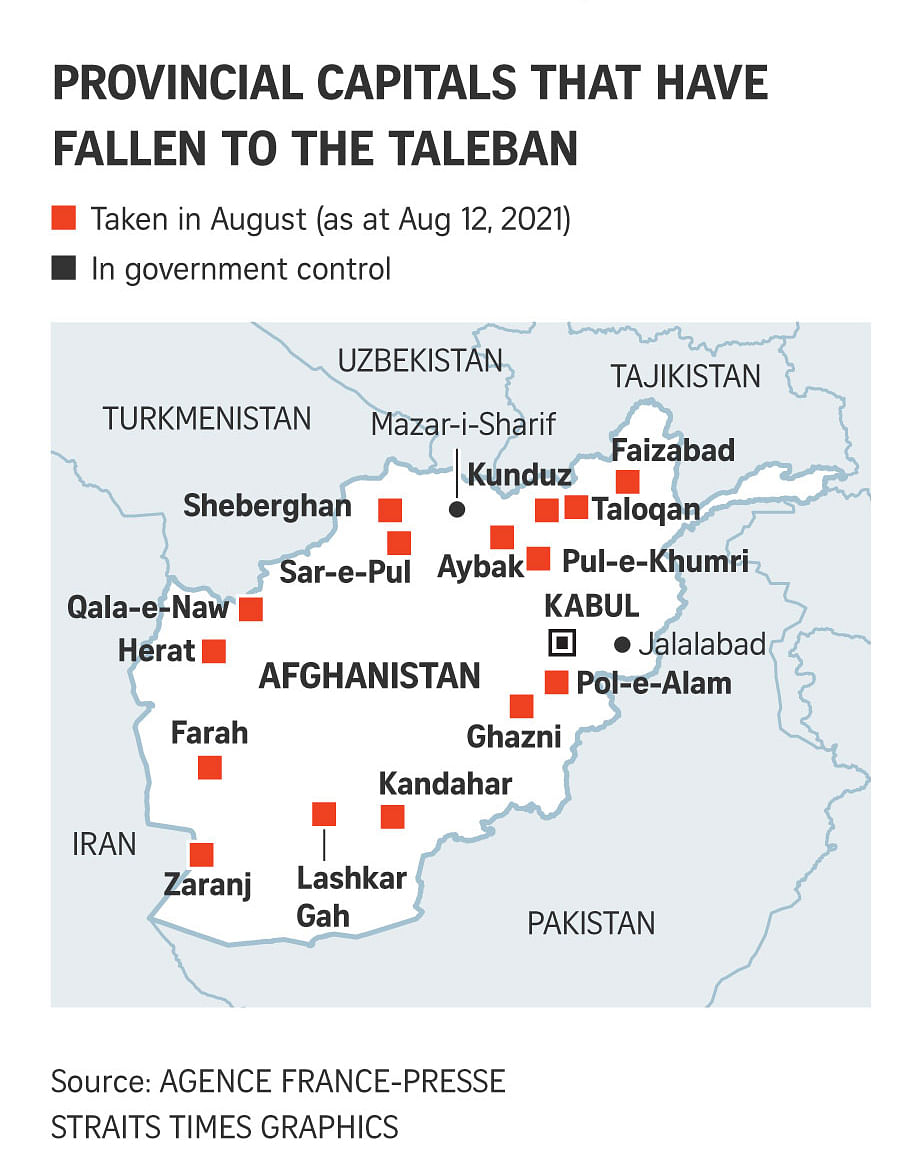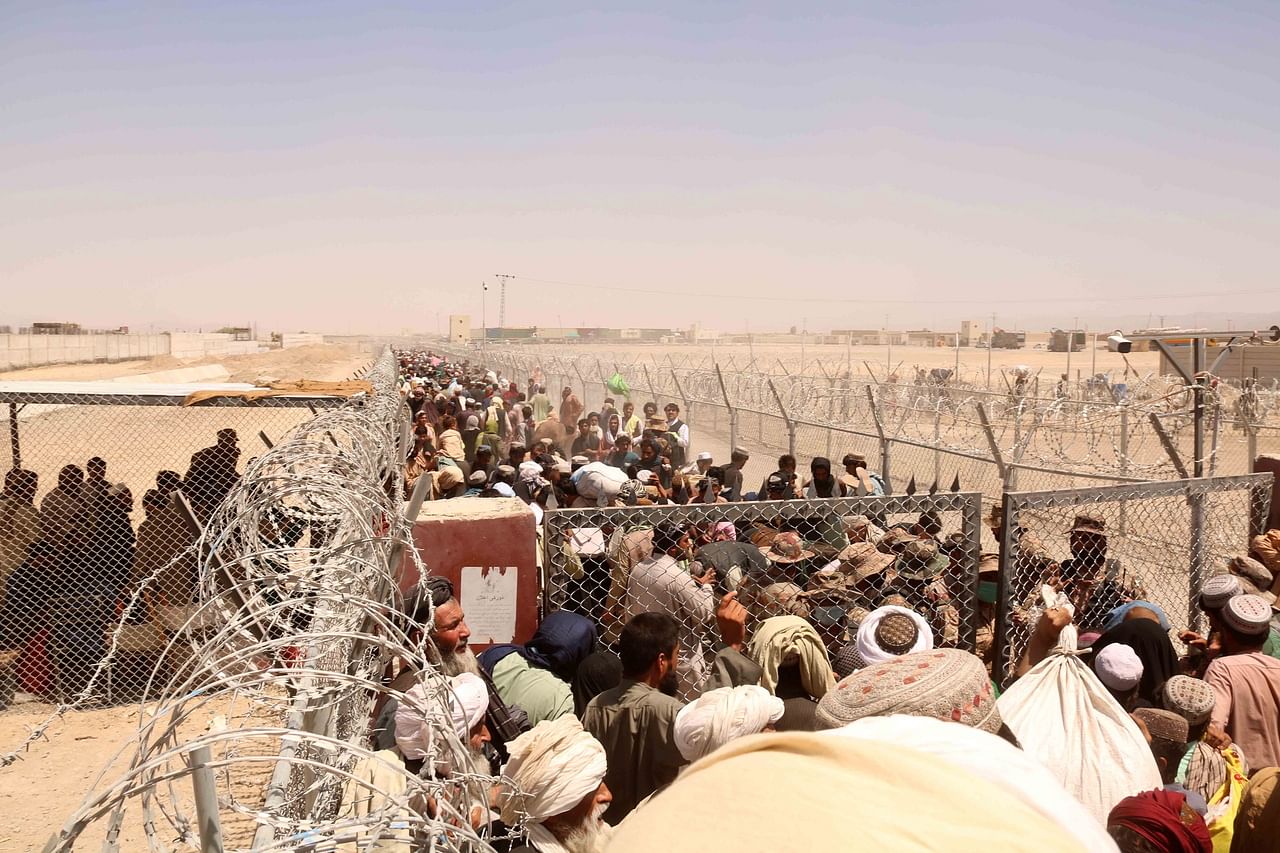Another 9-11? Afghanistan fall to the Taleban on Sep 11, 2021?
The world will be less safe.

Afghan National Army officers keep watch at a checkpoint in Kabul, on July 8, 2021.PHOTO: REUTERS
Aug 11, 2021
KABUL (REUTERS) - Taleban fighters could isolate Afghanistan's capital in 30 days and possibly take over it in 90, a US defence official told Reuters on Wednesday (Aug 11) citing US intelligence, as militants took control of an eighth provincial Afghan capital.
The Taleban now control 65 per cent of Afghanistan and have taken or threatened to take 11 provincial capitals, a senior EU official said on Tuesday.
The US official, speaking on condition of anonymity, said that the new assessment of how long Kabul could stand was a result of the rapid gains the Taleban had been making around the country as US-led foreign forces leave.
"But this is not a foregone conclusion," the official added, saying that the Afghan security forces could reverse the momentum by putting up more resistance.
Wednesday's loss of Faizabad, capital of the north-eastern province of Badakhshan, was the latest setback for the Afghan government, which has been struggling to stem the momentum of Taleban.
It came as President Ashraf Ghani flew in to Mazar-i-Sharif to rally old warlords to the defence of the biggest city in the north as Taleban forces close in.
Mr Jawad Mujadidi, a provincial council member from Badakhshan, said the Taleban had laid siege to Faizabad before launching an offensive on Tuesday.
"Unfortunately, after hours of heavy fighting the ANDSF retreated," Mr Mujadidi told Reuters, referring to national security forces. "With the fall of Faizabad, the whole of the north-east has come under Taleban control."
Badakhshan borders Tajikistan, Pakistan and China.
The Taleban are battling to defeat the US-backed government and reimpose strict Islamic law. The speed of their advance has shocked the government and its allies.
US President Joe Biden urged Afghan leaders to fight for their homeland, saying on Tuesday that he did not regret his decision to withdraw, noting that the United States had spent more than US$1 trillion (S$1.36 trillion) over 20 years and lost thousands of troops.
The US was providing significant air support, food, equipment and salaries to Afghan forces, he said.
The US will complete the withdrawal of its forces this month in exchange for Taleban promises to prevent Afghanistan being used for international terrorism.
The Taleban promised not to attack foreign forces as they withdraw but did not agree to a ceasefire with the government. A commitment by the Taleban to talk peace with the government side has come to nothing as they eye military victory.
"The US did not provide support... now we see the result," Mr Dawlat Waziri, a retired general and military analyst, told Reuters.
A new generation of Afghans, who have come of age since 2001, fears that the progress made in areas such as women's rights and media freedom will be squandered.
UN human rights chief Michelle Bachelet said on Tuesday that reports of violations that could amount to war crimes and crimes against humanity were emerging, including "deeply disturbing reports" of the summary execution of surrendering government troops.
Afghan officials have appealed for pressure on Pakistan to stop Taleban reinforcements and supplies flowing over the border. Pakistan denies backing the Taleban.
The government has withdrawn its forces from some hard-to-defend rural districts to focus on holding population centres. In some places, government forces have given up without a fight.
During their 1996-2001 rule, the Taleban were never completely in control of the north but this time, they seem intent on securing it before closing in on the capital.
Mr Ghani is now appealing for help from the old regional warlords he spent years sidelining as he attempted to project the authority of his central government over wayward provinces.
He was due to meet powerbrokers in Mazar-i-Sharif to work out coordination between the security forces and militias and operations to take back areas the Taleban captured, the president's office said.
In the south, government forces were battling Taleban fighters around the city of Kandahar and thousands of civilians from outlying areas had taken refuge there, a resident said.
Fighting was also taking place in city of Farah in the west, near the Iranian border, while the Ministry of Defence said in a statement security forces had also battled Taleban in Laghman, Logar, Paktia, Uruzgan, Zabul, Ghor, Balkh, Helmand, Kapisa and Baghlan provinces and 431 Taleban had been killed.
It gave no figure for casualties on the government side and a Taleban spokesman was not immediately available for comment.
The Taleban have captured districts bordering Tajikistan, Uzbekistan, Iran, Pakistan and China, heightening regional security concerns.
The world will be less safe.
Taleban could take Afghan capital in 90 days: US intelligence

Afghan National Army officers keep watch at a checkpoint in Kabul, on July 8, 2021.PHOTO: REUTERS
Aug 11, 2021
KABUL (REUTERS) - Taleban fighters could isolate Afghanistan's capital in 30 days and possibly take over it in 90, a US defence official told Reuters on Wednesday (Aug 11) citing US intelligence, as militants took control of an eighth provincial Afghan capital.
The Taleban now control 65 per cent of Afghanistan and have taken or threatened to take 11 provincial capitals, a senior EU official said on Tuesday.
The US official, speaking on condition of anonymity, said that the new assessment of how long Kabul could stand was a result of the rapid gains the Taleban had been making around the country as US-led foreign forces leave.
"But this is not a foregone conclusion," the official added, saying that the Afghan security forces could reverse the momentum by putting up more resistance.
Wednesday's loss of Faizabad, capital of the north-eastern province of Badakhshan, was the latest setback for the Afghan government, which has been struggling to stem the momentum of Taleban.
It came as President Ashraf Ghani flew in to Mazar-i-Sharif to rally old warlords to the defence of the biggest city in the north as Taleban forces close in.
Mr Jawad Mujadidi, a provincial council member from Badakhshan, said the Taleban had laid siege to Faizabad before launching an offensive on Tuesday.
"Unfortunately, after hours of heavy fighting the ANDSF retreated," Mr Mujadidi told Reuters, referring to national security forces. "With the fall of Faizabad, the whole of the north-east has come under Taleban control."
Badakhshan borders Tajikistan, Pakistan and China.
The Taleban are battling to defeat the US-backed government and reimpose strict Islamic law. The speed of their advance has shocked the government and its allies.
US President Joe Biden urged Afghan leaders to fight for their homeland, saying on Tuesday that he did not regret his decision to withdraw, noting that the United States had spent more than US$1 trillion (S$1.36 trillion) over 20 years and lost thousands of troops.
The US was providing significant air support, food, equipment and salaries to Afghan forces, he said.
The US will complete the withdrawal of its forces this month in exchange for Taleban promises to prevent Afghanistan being used for international terrorism.
The Taleban promised not to attack foreign forces as they withdraw but did not agree to a ceasefire with the government. A commitment by the Taleban to talk peace with the government side has come to nothing as they eye military victory.
Some Afghans feel abandoned as the US and other Western powers withdraw, leaving the Taleban to make their move."The US did not provide support... now we see the result," Mr Dawlat Waziri, a retired general and military analyst, told Reuters.
Regional appeal
The Taleban advances have raised fears of the return to power of the hardline militants, who emerged in the early 1990s from the chaos of civil war and controlled most of the country from 1996 to 2001, when they were ousted by a US-led campaign for harbouring Al-Qaeda chief Osama bin Laden.A new generation of Afghans, who have come of age since 2001, fears that the progress made in areas such as women's rights and media freedom will be squandered.
UN human rights chief Michelle Bachelet said on Tuesday that reports of violations that could amount to war crimes and crimes against humanity were emerging, including "deeply disturbing reports" of the summary execution of surrendering government troops.
Afghan officials have appealed for pressure on Pakistan to stop Taleban reinforcements and supplies flowing over the border. Pakistan denies backing the Taleban.
The government has withdrawn its forces from some hard-to-defend rural districts to focus on holding population centres. In some places, government forces have given up without a fight.
During their 1996-2001 rule, the Taleban were never completely in control of the north but this time, they seem intent on securing it before closing in on the capital.
Mr Ghani is now appealing for help from the old regional warlords he spent years sidelining as he attempted to project the authority of his central government over wayward provinces.
He was due to meet powerbrokers in Mazar-i-Sharif to work out coordination between the security forces and militias and operations to take back areas the Taleban captured, the president's office said.
In the south, government forces were battling Taleban fighters around the city of Kandahar and thousands of civilians from outlying areas had taken refuge there, a resident said.
Fighting was also taking place in city of Farah in the west, near the Iranian border, while the Ministry of Defence said in a statement security forces had also battled Taleban in Laghman, Logar, Paktia, Uruzgan, Zabul, Ghor, Balkh, Helmand, Kapisa and Baghlan provinces and 431 Taleban had been killed.
It gave no figure for casualties on the government side and a Taleban spokesman was not immediately available for comment.
The Taleban have captured districts bordering Tajikistan, Uzbekistan, Iran, Pakistan and China, heightening regional security concerns.


























